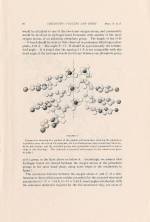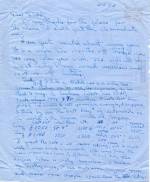| "I Do Not See What Holds It Together...." |
|
When Pauling's much anticipated DNA manuscript arrived via Peter in early February
1953, both researchers were surprised to see something that looked like their own
abortive three-chain effort, only more tightly put together. A few minutes' reading
showed that there was no room at the core for the positive ions needed to hold together
the negatively charged phosphates.
Crick and Watson were dumbfounded. Pauling's structure depended on hydrogen bonds
between the phosphate groups, but how could there be a hydrogen there when the phosphates
in DNA lost their hydrogens at normal pH? "Without the hydrogen atoms, the chains
would immediately fly apart," Watson said. They had already been through this with
their own model, but they checked it again, and there it was in black and white in
a respected text: The phosphates had to be ionized. The text they consulted was Pauling's
General Chemistry. "If a student had made a similar mistake, he would be thought unfit to benefit from
Caltech's chemistry faculty," Watson later wrote.
He and Crick immediately went off to confirm their criticism with Cambridge's chemists.
Before the day was out, Pauling's mistake was the talk of the college. With obvious
satisfaction, Crick wrote Pauling, "We were very struck by the ingenuity of the structure....The
only doubt I have is that I do not see what holds it together." Pauling's apparent
misstep pleased Bragg so much that he officially agreed to let Crick and Watson go
back full-time to DNA. There was a window of opportunity here, and he wanted the Cavendish
to take advantage before Pauling had time to regroup.
|
|
Click images to enlarge

"A proposed structure for the nucleic acids." February 1953.

Letter from Peter Pauling to Linus and Ava Helen Pauling. February 3, 1953.
"At once I felt something was not right. I could not pinpoint the mistake, however,
until I looked at the illustrations for several minutes. Then I realized that the
phosphate groups in Linus' model were not ionized, but that each group contained a
bound hydrogen atom and so had no net charge. Pauling's nucleic acid in a sense was
not an acid at all...a giant had forgotten elementary college chemistry."
"I gave Watson essentially the paper on nucleic acids, and after the 12th he showed
it. Morris [sic] Wilkins is supposed to be doing this work; Miss Franklin evidently
is a fool. Relations are now slightly strained due to the Watson-Crick entering the
field. They (W.C.) have some ideas and shall write you immediately. It is really up
to them and not to me to tell you about it. We tried to build your structure, and
succeeded, I think, it was pretty tight. Perhaps we should try the new one. They are
getting pretty involved with their own efforts, and losing objectivity."
|

